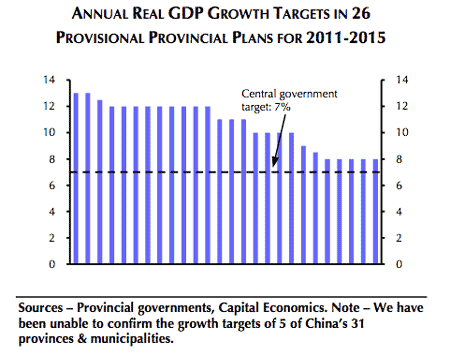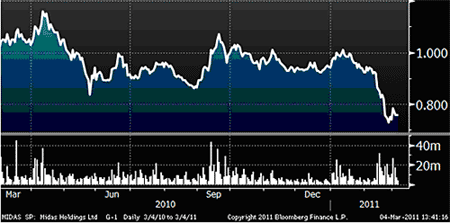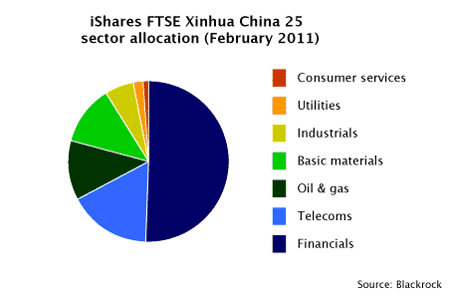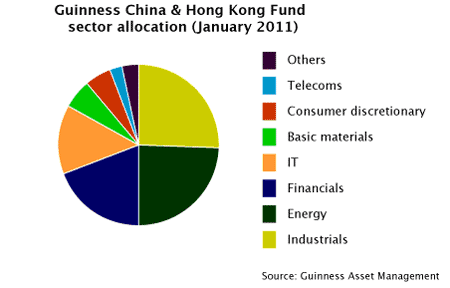A new China fund worth watching
The Chinese government's new five-year plan calls for growth of 7%. That may or may not be achievable. But if you plan to invest in China, it's something that you should bear in mind. One new fund aims to tap into this growth - and it could well be worth a look, says Cris Sholto Heaton.

Get the latest financial news, insights and expert analysis from our award-winning MoneyWeek team, to help you understand what really matters when it comes to your finances.
You are now subscribed
Your newsletter sign-up was successful
Want to add more newsletters?

Twice daily
MoneyWeek
Get the latest financial news, insights and expert analysis from our award-winning MoneyWeek team, to help you understand what really matters when it comes to your finances.

Four times a week
Look After My Bills
Sign up to our free money-saving newsletter, filled with the latest news and expert advice to help you find the best tips and deals for managing your bills. Start saving today!
So it's official. China will grow at 7% per year over the next five years. Or so says the target in the new five-year plan, which will shortly be unveiled in full at the annual National People's Congress.
Obviously, real life won't be quite so cooperative. Fate has a way of derailing plans like these.
Even so, this target is important. Government dictat has a major effect on many industries in China. And that's something you should bear in mind when thinking about how to invest
MoneyWeek
Subscribe to MoneyWeek today and get your first six magazine issues absolutely FREE

Sign up to Money Morning
Don't miss the latest investment and personal finances news, market analysis, plus money-saving tips with our free twice-daily newsletter
Don't miss the latest investment and personal finances news, market analysis, plus money-saving tips with our free twice-daily newsletter
The government aims for slower but better growth
Just so we don't take the 7% target too literally, let's see how central government's view of what should be done differs from the provinces. The chart below from Capital Economics sums it up nicely. The local growth target for every province is higher than the national target. In most cases, the difference is substantial.

In practice, the government's goal might turn out closer to reality than the provinces' predictions. China's demographics suggest that the pool of surplus labour as workers move from agriculture into the modern economy may be drying up. If that's true and it is still an "if" this will lower the country's trend growth.
But the accuracy of the target isn't the point. It's the bigger picture that matters. The government wants to ensure slower, higher-quality growth. It wants to keep inflation under control, share the benefits of growth more evenly, reduce opportunities for corruption and pay more attention to the environment.
Those are tough challenges. They may not be fully achieved. But it suggests that the government will be trying to intervene more in the economy. That means investors will once again get a lesson in why government policy matters.
Will the railway boom fizzle out?
Let's look at a couple of examples to see how policy can switch from supportive to damaging very quickly. Consider railways. China has embarked on a major railway-building programme in the last few years, with a focus on high-speed rail links.
This investment boom, underwritten by the government, has looked pretty appealing to many companies that should win business from this and to their investors.
So it was a major shock when railways minister Liu Zhijun was sacked from his post in early February. The ex-minister is now under investigation for severe disciplinary violations. This usually indicates that corruption charges will follow. And several other officials and business people linked to him are being investigated.
The timing could be politically motivated. Liu has some ties to former president Jiang Zemin and there are some reports of conflict between a faction around Jiang and his successor Hu Jintao ahead of next year's party congress. But Liu has a long-standing reputation for incompetence and corruption, so it seems likely that his fall is deserved, regardless of what pushed him.
Clearly this raises the possibility that the programme will be scaled down.
Even before this story broke, there were reports that some policymakers wanted a full review. Now substantial cutbacks look quite plausible. So stocks seen as geared to the railway story, such as Singapore's Midas Holdings (which makes aluminium alloys used in train bodies), have fallen sharply of late.

Chinese banks are still a bad investment
Or consider banks. This is a sector subject to heavy state oversight. During the crisis, they were ordered to expand lending rapidly to stimulate the economy. They responded all too well, with loan growth soaring. This boosted earnings. But regulators have become concerned about potential bad loans; lending to unproductive companies and local government projects; and money flowing into bubble-prone sectors such as real estate.
So regulators are getting tougher. Interest rates play a fairly small role in controlling credit in China. Raising them is politically tricky for the central bank (not everyone thinks policy should be tightened). So regulators' long-standing approach to containing banks involves other measures such as overall lending quotas and 'window guidance' on which sectors and firms not to lend too.
These obviously weren't working well enough, so this year they began bringing in new tools. Banks are likely to require higher levels of capital and provisions of bad loans and have to set aside greater reserves at the central bank.
And the regulators will tailor requirements to individual banks, imposing tougher rules on those they believe are lending too much and too recklessly. Whether this will work is not certain. But it's clear the intent is to subject banks to ever more oversight to try to clear up any problems in the loan books and stop new ones developing. Banks probably face weaker earnings growth and may have to carry out more rights issues not good news for their investors.
Why indexing may not work well in China
Clearly, Chinese politicians try to manage the economy much more than most foreigners are used to. So changes in policy are a major risk for many stocks. That doesn't mean it's not possible to make money from investing in China. The economy is growing and developing very quickly. But some firms and industries have much more freedom than others. In my view, it's stocks that are less subject to policy that you want to invest in.
Why is that a problem with many investors' strategy for China? If you own an exchange-traded fund (ETF), it's probably based on a major benchmark such as the FTSE Xinhua China 25.
In my opinion, this is an appalling index. As the chart below shows, fully 50% of the portfolio is in financials the majority of which is those same, highly policy-sensitive banks I mentioned above.

If you dig further into the portfolio, the situation becomes even worse. Of the 25 stocks in the index, 23 are controlled or heavily influenced by the government. Essentially, with this fund you're investing in government policy there's little in the basket that I'd want to own in its own right.
This shows how we need to be careful about taking the ETF approach too far. ETFs are a great tool for providing lower cost, easily-traded options for investors. But as the number of emerging market ETFs grow, it's important to bear in mind that many emerging market indices are not ideal for index investment. Most are not well-balanced or contain many poor quality companies.
So it's important to weigh up the cost and convenience of ETFs against the extra that a managed fund could offer in these markets. Obviously, I stress the "could" here, because many managed funds are poorly run or trackers in all but name.
But my view is that reasonably competent active management of a portfolio stands a significantly higher chance of beating the market over the long term in a country such as China than it does in more developed markets.
A new China fund that may be worth watching
When it comes to actively managed investments, my preference is for direct investment in shares or investment trusts/closed-end funds. However, I know that many of you prefer open-end funds (unit trusts and oeics). This week I met the managers of a new one that looks like it might be worth watching.
The fund is the Guinness China and Hong Kong fund, run by Edmund Harriss and James Weir. They also manage a wider Asia Focus Fund. These funds were launched at the end of last year and are now being marketed to UK retail investors as well as institutions by a boutique called Guinness Asset Management. However, they are based on strategies used in two long-running US funds managed by Harriss at the US arm of the company, so they have some track record to go on.
It's hard to form an opinion on a fund from a single meeting and past performance is often a poor guide to the future. However, for what it's worth, the US version of the China fund has a good track record, beating the Hang Seng by 3.4 percentage points a year over the last five years and 1.8 percentage points a year over ten years after costs.
The managers' approach seems to favour good quality companies, with attention paid to governance standards and value. Their holdings are very different to the index, as the chart below shows. For example, financials are under 20% of the portfolio, while the larger banking positions are Hong Kong banks such as BOC Hong Kong and Dah Sing much better quality investments than the mainland banks. And the portfolio looks well focused, with 39 positions at present.

Managed fund charges are becoming more competitive these days in response to the ETF boom. The Guinness fund is towards the cheaper end of the range, with an annual management charge of 1.5%. Running costs are expected to be in the order of 0.49 percentage points per year giving an estimated annual total expense ratio (TER) of 1.99%.
Limitations include a minimum investment size of £5,000, which is higher than usual for a fund that hopes to capture UK retail investors. And for now, the fund is not available through the most popular fund supermarkets, meaning that it's not possible to duck the 5% entry charge by going through a discount broker such as Hargreaves Lansdown or Chartwell.
However, it's always good to see a new fund where the manager appears to want to do more than hug the benchmark. So this one looks worth watching as an alternative to more established open-end funds such as the First State China Growth Fund.
Update: Discounts for buying direct are unusual for a fund provider, but in this case the managers tell me that the entry charge will be reduced to 2% if bought directly from Guinness.
Get the latest financial news, insights and expert analysis from our award-winning MoneyWeek team, to help you understand what really matters when it comes to your finances.

Cris Sholt Heaton is the contributing editor for MoneyWeek.
He is an investment analyst and writer who has been contributing to MoneyWeek since 2006 and was managing editor of the magazine between 2016 and 2018. He is experienced in covering international investing, believing many investors still focus too much on their home markets and that it pays to take advantage of all the opportunities the world offers.
He often writes about Asian equities, international income and global asset allocation.
-
 Review: Eliamos Villas Hotel & Spa – revel in the quiet madness of Kefalonia
Review: Eliamos Villas Hotel & Spa – revel in the quiet madness of KefaloniaTravel Eliamos Villas Hotel & Spa on the Greek island of Kefalonia is a restful sanctuary for the mind, body and soul
-
 How a ‘great view’ from your home can boost its value by 35%
How a ‘great view’ from your home can boost its value by 35%A house that comes with a picturesque backdrop could add tens of thousands of pounds to its asking price – but how does each region compare?